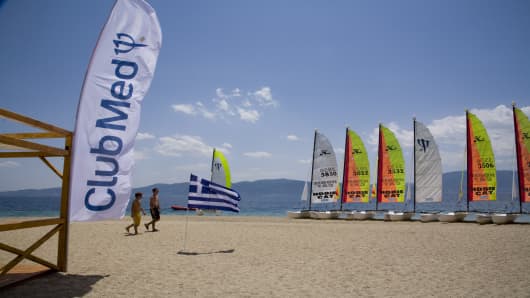That could be the future for Club Med, the French resort operator, which said Monday that it had received a $700 million buyout offer led by its two largest shareholders, an investment unit of the French insurer AXA and a Chinese conglomerate called Fosun International.
The proposed deal gives a Chinese company an unusually visible role in the acquisition and development of a prominent Western brand, which was founded in 1950 by a Belgian water polo player and for years defined the packaged exoticism of beach vacations for Europeans and North Americans. Now, though, the ascent of the Chinese tourist is helping reshape the world's idea of the ideal getaway.
Club Méditerranée has long been known for the blend of escapist fun and Frenchness in its vacation formula — including the staff's frequent performance of synchronized, heavily gesticulated dance moves set to pop music.
With Chinese co-ownership, Club Med cannot help becoming a bit less French. It has been hit hard by the euro crisis, during which its name has been borrowed by economists as an epithet for the debt-ridden and austerity-ravaged countries of Southern Europe.
Club Med is looking to emerging markets, especially China, for new customers and new resorts, which it calls villages.
(Read More: China Profit Growth Quickens, No Harbinger of Recovery)
"We have to accelerate our growth in emerging markets, the largest of which is China," Henri Giscard d'Estaing, chief executive of Club Med, said by telephone on Monday. "That takes time, and you need shareholder and management stability. The goal of this agreement is to provide that stability."
Club Med ventured into China in 2010, opening a village at a ski resort called Yabuli, in the northeastern province of Heilongjiang. Since then Club Med has added a second Chinese village, in the southern city of Guilin, known for its unusual, tombstone-shaped peaks.
At Yabuli, which attracts mostly domestic visitors, Club Med has adapted its entertainment offerings to suit local tastes, adding karaoke evenings, for example. Mah-jongg tables have replaced the poker and bridge tables, or Scrabble boards, at other Club Med villages.
China overtook the United States two years ago as the world's biggest source of foreign tourists. Mainland Chinese made 70 million overseas trips in 2011. That outpaced the 58.5 million overseas trips by Americans the same year. And last year, China for the first time became the biggest spender in global tourism. Outlays by Chinese traveling overseas reached $102 billion, up 40 percent from 2011, according to the United Nations World Tourism Organization. Germans and Americans ranked second and third, each spending about $84 billion on their foreign trips, the agency said.
Club Med, while sticking to the concept of all-inclusive packages, in which it was a pioneer, has gone through many changes, and owners, since it opened its first resort on the Spanish island of Mallorca in 1950. In the early years, the resorts were designed as prototypical New Age retreats, where the visitors mingled socially with the staff.
The offbeat atmosphere evolved with the times. The stereotypical Club Med customer of the 1960s and '70s was satirized in "Les Bronzés," a racy 1978 French film directed by Patrice Leconte, in which a group of European visitors to a Club Med village in Ivory Coast take turns hooking up.
(Read More: China, Germany Could Be 'Dream Team:' Premier Li)
In the 1990s, Club Med tried to attract budget travelers, but was unable to compete with low-fare airlines and the Internet. It also branched into sports clubs. Over the last decade, it has moved upmarket, closing dozens of resorts, revamping others and repositioning its marketing to appeal to families.
So far, though, Club Med remains heavily dependent on Europe, which is a reason it has booked annual losses for five of the last seven years. Revenue has not regained the level of 1.1 billion euros ($1.4 billion) reached in 2008.
Investors cheered the 17 euros a share French-Chinese buyout offer on Monday, sending Club Med's stock up 22 percent, to 16.95 euros, in Paris trading. The offer is a 23 percent premium over Club Med's closing price on Friday.
Central to Club Med's strategy to win more Chinese customers was a deal in 2010 that first brought in Fosun, which is based in Shanghai, as a strategic investor. Fosun has bought further shares since 2010, so that it now owns 9.96 percent of the share capital and 16.48 percent of the voting rights of Club Med.


